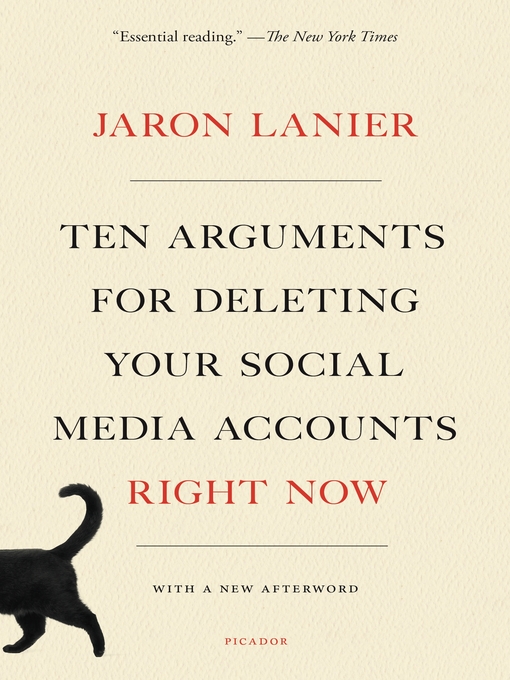
Ten Arguments for Deleting Your Social Media Accounts Right Now
کتاب های مرتبط
- اطلاعات
- نقد و بررسی
- دیدگاه کاربران
نقد و بررسی

April 30, 2018
Virtual reality pioneer Lanier (Dawn of the New Everything: Encounters with Reality and Virtual Reality) tediously reiterates well-known pitfalls of social media, arguing that the major platforms are manipulating users’ thoughts, goading their inner trolls, tearing society apart, and just generally making everyone unhappy. Lanier, a Silicon Valley insider, spells out his arguments against social media in 10 breezy chapters with titles like “You Are Losing Your Free Will” and “Social Media Is Making Politics Impossible.” His underlying argument takes aim at the business models behind popular platforms like Facebook and Google that enable third-party actors such as advertisers—to pay to modify users’ behavior using personalized, continuously adjusted stimuli. Unfortunately, his short treatise is overridden with shallow political commentary (as when he refers to Trump as a victim of Twitter) and scant analysis of critical issues (he’s quick to dismiss the role of social media in the #MeToo movement, Black Lives Matter, and the Arab Spring uprisings). Baseless generalizations and vague platitudes undermine the author’s case, which is particularly unfortunate given his experience and expertise in the world he skewers.

In a book whose title says it all, technoprophet Lanier (Dawn of the New Everything, 2017, etc.) weighs in against predatory technoprofit.In a world of dogs, it's better to be a cat. So, in this brief polemic, writes the author, who uses the animal terms advisedly: Dogs are easily trained to respond to stimuli, as Ivan Pavlov knew; humans are as easily trained, à la B.F. Skinner, when given proper rewards. "Dog whistles," Lanier adds meaningfully, "can only be heard by dogs." Cats, on the other hand, live in the world while somehow not being quite of it, a model for anyone seeking to get out of the grasp of algorithms and maybe go outside for a calming walk. The metaphor has value. So does the acronym BUMMER, which Lanier coins to sum up the many pieces of his argument: "Behavior of Users Modified, and Made into an Empire for Rent." It's a little clunky, but the author scores points with more direct notes: "E," he writes, "is for Earning money from letting the worst assholes secretly screw with everyone else." As we're learning from the unfolding story of Cambridge Analytica, which just filed for bankruptcy, he's got a point. Lanier advocates untethering from social media, which fosters addiction and anomie and generally makes us feel worse and more fearful about each other and the world. Continuing the dog metaphor, it--Lanier uses "media" as a singular noun, which, considering its monolithic nature, may no longer send grammarians screaming--also encourages pack behavior, howling at strangers and sounds in the night. His central objection, though, would seem to be this: "We have enshrined the belief that the only way to finance a connection between two people is through a third person who is paying to manipulate them." If we accept that, then it's self-evident why one would want to unplug.The experiment could be a useful one, though it will darken the hearts of the dark lords--a winning argument all its own.
COPYRIGHT(2018) Kirkus Reviews, ALL RIGHTS RESERVED. (Online Review)

























دیدگاه کاربران